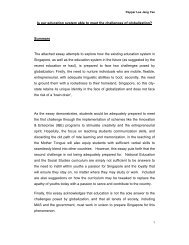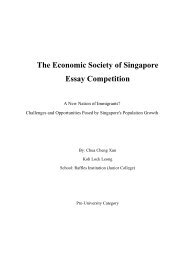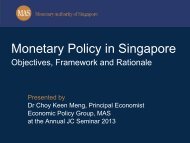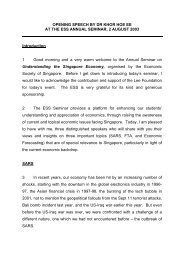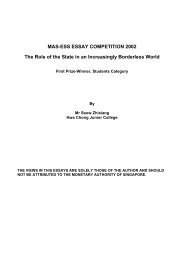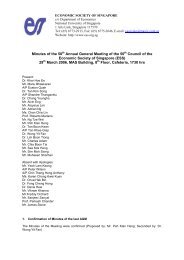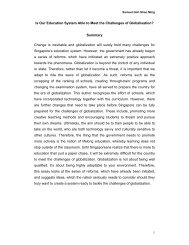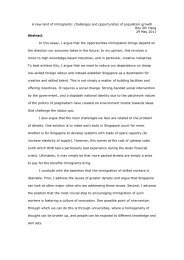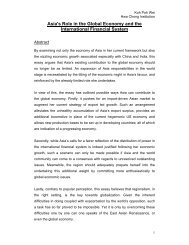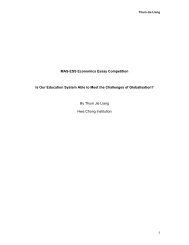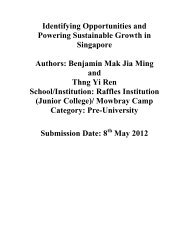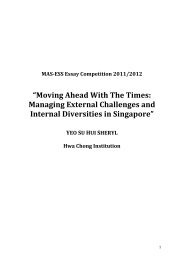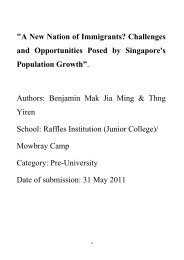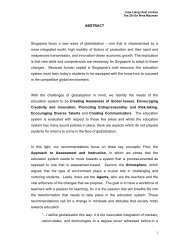the role of the state in an increasingly borderless world - Economic ...
the role of the state in an increasingly borderless world - Economic ...
the role of the state in an increasingly borderless world - Economic ...
- No tags were found...
Create successful ePaper yourself
Turn your PDF publications into a flip-book with our unique Google optimized e-Paper software.
“The nation <strong>state</strong> is about through as <strong>an</strong> economic unit” 1<br />
-- Charles K<strong>in</strong>dleberger, 1969<br />
Pronouncements on <strong>the</strong> demise <strong>of</strong> <strong>the</strong> <strong>state</strong> have been <strong>in</strong> vogue for over 30 years. Yet<br />
read<strong>in</strong>g contemporary literature on globalisation <strong>an</strong>d <strong>in</strong>ternational <strong>in</strong>tegration, one c<strong>an</strong>not help<br />
but to be struck by <strong>the</strong> newfound confidence with which <strong>the</strong> <strong>state</strong> cont<strong>in</strong>ues to be pronounced<br />
<strong>an</strong> outdated <strong>an</strong>d moribund <strong>in</strong>stitution. These claims have reached new heights with authors<br />
such as Kenichi Ohmae declar<strong>in</strong>g that <strong>in</strong> The (already) Borderless World, people, firms, <strong>an</strong>d<br />
market matter more, <strong>an</strong>d <strong>state</strong>s less. 2 Echo<strong>in</strong>g K<strong>in</strong>dleberger’s words from 30 years ago, Lester<br />
Thurow has declared that “as <strong>an</strong> externally sovereign actor, . . (<strong>the</strong> <strong>state</strong>) . . . will become a<br />
th<strong>in</strong>g <strong>of</strong> <strong>the</strong> past.” 3 If <strong>in</strong>deed this were <strong>the</strong> case <strong>the</strong>n <strong>the</strong> simple <strong>an</strong>swer to <strong>the</strong> question on <strong>the</strong><br />
<strong>role</strong> <strong>of</strong> <strong>the</strong> <strong>state</strong> <strong>in</strong> a <strong>borderless</strong> <strong>world</strong> is that it is dim<strong>in</strong>ish<strong>in</strong>g to <strong>the</strong> po<strong>in</strong>t <strong>of</strong> <strong>in</strong>signific<strong>an</strong>ce.<br />
But rumours <strong>of</strong> <strong>the</strong> <strong>state</strong>’s demise have been somewhat over<strong>state</strong>d. While<br />
<strong>borderless</strong>ness <strong>an</strong>d <strong>the</strong> associated phenomenon <strong>of</strong> <strong>in</strong>terdependence have certa<strong>in</strong>ly ch<strong>an</strong>ged<br />
<strong>the</strong> context <strong>in</strong> which it operates, <strong>the</strong> modern <strong>state</strong> appears to be alive <strong>an</strong>d well. This essay will<br />
consider <strong>the</strong> extent to which <strong>in</strong>creas<strong>in</strong>g <strong>borderless</strong>ness circumscribes <strong>the</strong> bounds <strong>of</strong> possible<br />
<strong>state</strong> action while at <strong>the</strong> same time tr<strong>an</strong>sform<strong>in</strong>g <strong>the</strong> <strong>role</strong>s <strong>of</strong> <strong>the</strong> <strong>state</strong> <strong>an</strong>d creat<strong>in</strong>g new<br />
imperatives for policy. 4<br />
A Borderless World<br />
The last two decades have seen <strong>an</strong> accelerat<strong>in</strong>g growth <strong>in</strong> <strong>the</strong> volume <strong>an</strong>d variety <strong>of</strong><br />
cross border tr<strong>an</strong>sactions <strong>in</strong> goods, services, <strong>an</strong>d <strong>in</strong>ternational f<strong>in</strong><strong>an</strong>cial flows. This rapid<br />
<strong>in</strong>tegration <strong>of</strong> <strong>the</strong> <strong>world</strong> economy has been fuelled by new technologies, <strong>the</strong> spread <strong>of</strong><br />
<strong>in</strong>formation, <strong>an</strong>d <strong>the</strong> grow<strong>in</strong>g import<strong>an</strong>ce <strong>of</strong> knowledge-based <strong>in</strong>dustries. These have drastically<br />
lowered costs <strong>of</strong> tr<strong>an</strong>saction, <strong>in</strong>formation, <strong>an</strong>d mobility for a wide variety <strong>of</strong> economic actors.<br />
Interdependence has grown not just between countries, but also among groups with<strong>in</strong> <strong>the</strong>m.<br />
Obviously <strong>the</strong> <strong>world</strong> is far from be<strong>in</strong>g completely <strong>borderless</strong> – <strong>the</strong>re cont<strong>in</strong>ues to be<br />
numerous regulatory <strong>an</strong>d political limits to free flows <strong>in</strong> trade, people, <strong>an</strong>d technology. It is also<br />
clear that economic <strong>in</strong>tegration is uneven across <strong>in</strong>dustries; <strong>in</strong>tegration <strong>of</strong> f<strong>in</strong><strong>an</strong>cial markets for<br />
example, leads that <strong>of</strong> all o<strong>the</strong>r fields. Borderlessness <strong>an</strong>d <strong>in</strong>terdependence also show a clear<br />
geographical bias with <strong>the</strong> developed North be<strong>in</strong>g far more <strong>in</strong>tegrated th<strong>an</strong> <strong>the</strong> still develop<strong>in</strong>g<br />
South. 5 But all that said, it is fairly clear that <strong>the</strong> <strong>world</strong> economy is more <strong>borderless</strong> <strong>an</strong>d<br />
<strong>in</strong>tegrated th<strong>an</strong> it ever was before <strong>an</strong>d that <strong>the</strong> overall trend is towards more ra<strong>the</strong>r th<strong>an</strong> less<br />
openness. Therefore <strong>the</strong> <strong>in</strong>tention <strong>of</strong> this essay is not to enter <strong>in</strong>to a detailed debate about <strong>the</strong><br />
extent <strong>of</strong> global <strong>in</strong>tegration, but to accept its <strong>in</strong>evitability <strong>an</strong>d consider its implications on <strong>state</strong><br />
policy.<br />
1 Charles P. K<strong>in</strong>dleberger (1969) p. 207.<br />
2 Kenichi Ohmae (1990).<br />
3 Lester C. Thurow (1999). p. 137.<br />
4 Interdependence that is borne out <strong>of</strong> <strong>the</strong> dissipation <strong>of</strong> <strong>in</strong>ternational borders has clear political <strong>an</strong>d social<br />
implications, each <strong>of</strong> which could be <strong>the</strong> topic <strong>of</strong> a separate piece <strong>of</strong> research. This essay will focus<br />
ma<strong>in</strong>ly on economic aspects <strong>of</strong> <strong>in</strong>tegration.<br />
5 L<strong>in</strong>da Weiss (1998), for example, po<strong>in</strong>ts out that as <strong>of</strong> 1991 81% <strong>of</strong> <strong>the</strong> <strong>world</strong> stock <strong>of</strong> foreign direct <strong>in</strong>vestment was<br />
<strong>in</strong> high wage countries <strong>of</strong> <strong>the</strong> north. She adds that <strong>the</strong> extent <strong>of</strong> this concentration has grown by 12 po<strong>in</strong>ts s<strong>in</strong>ce<br />
1967. p. 72.<br />
27



